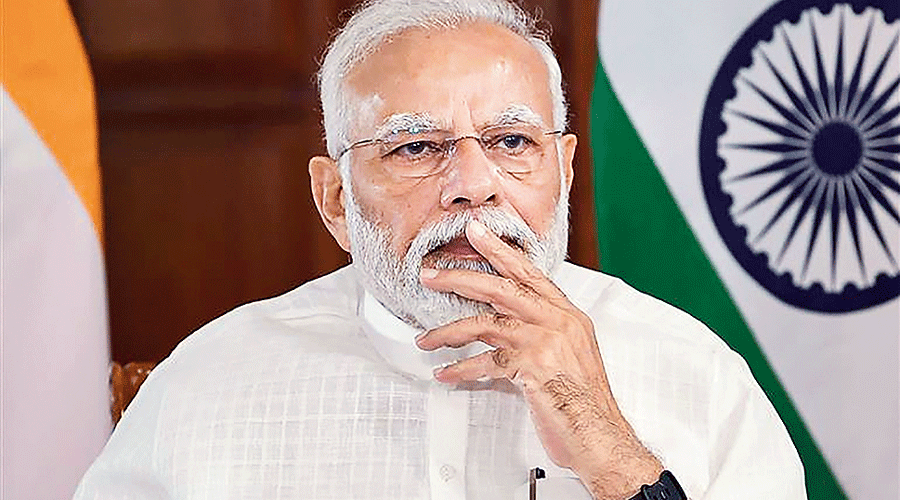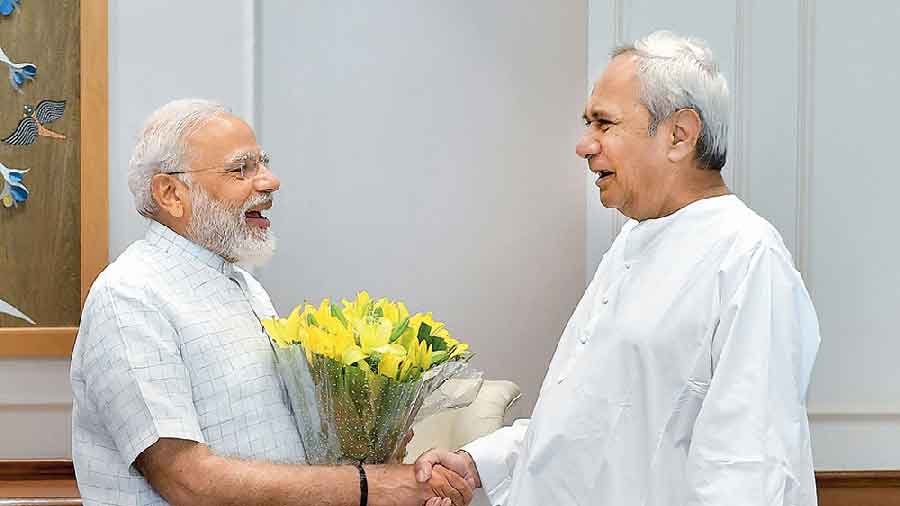When Prime Minister Narendra Modi unfurls the Tricolour at the Red Fort on Monday, the lofty but unfulfilled promises he had made in relation to the year India completes 75 years of Independence may come back to haunt him.
Unless he has forgotten about them like the repatriation of black money and Rs 15 lakh-in-every-account jumla, or the pledge to create 2 crore jobs every year.
The deadline of August 15, 2022, was supposed to usher in such markers of progress as pucca houses and 24x7 electricity for all, a doubling of farmers’ income, an end to malnutrition, the Mumbai-Ahmedabad bullet train and — believe it or not — the death of casteism and communalism.
Videos of Modi promising these and a lot more have been circulating on social media.
However, while betraying an inclination to forget his promises, Modi has also shown a knack for swiftly moving to newer targets and deadlines to control the political narrative and the people’s imagination.
After becoming Prime Minister in 2014, he had created a hoopla around Swachh Bharat — when many had expected him to focus on his big-ticket promises on black money and jobs — and begun talking of a “new India in 2022” and the 75th year of Independence.
Forgotten were the catchy acronyms like “P2G2” (Pro-people good governance) amid the downpour of new promises.
Modi had said in the run-up to the 2014 general election that he would take firm action to purge Parliament of criminals, no matter which party they belonged to.
According to the NGO Association of Democratic Reforms, 233 or 43 per cent of 539 MPs elected in the 2019 general election faced criminal charges, compared with 185 or 34 per cent of those elected in 2014.
On Friday, the Congress asked Modi whether his 2022 deadline would be extended or forgotten.
“Two days from now, we will celebrate 75 years of our Independence. We would like to remind the Modi government about their promises for the year 2022 — that every Indian will have a house, farmers’ income will double, the bullet train will be operational… the list goes on,” Congress spokesperson Gourav Vallabh said.
“The Prime Minister is now harping on the ‘rewri’ (a small sweet and a euphemism for freebies) culture. Something the poor get for survival is called ‘rewri’. But what about ‘jhooth ki gathri’ (bundle of lies)? Will he make new promises this Independence Day, continuing with his culture of smoke and mirrors?”
Modi has, however, outpaced the imagination of the Opposition. He is already selling dreams about the global pre-eminence that India would achieve by the time it celebrates the centenary of Independence in 2047.
After winning the 2019 election, Modi had floated the balloon of a $5-trillion economy, while soaring unemployment tormented Indians.
Unlike the Rs 15 lakh promise, Modi’s pledges for 2022 would not have sounded like jumlas (rhetoric) to most people, least of all the Niti Aayog, which released a “Strategy for New India @75” document in December 2018 listing the Centre’s sector-wise policy targets for 2022.
Apart from the popular pledges like the doubling of farmers’ income and houses for all, the Niti Aayog document also spoke of a broadband Internet connection in every village, and an India free of malnutrition, poverty, terrorism, casteism and communalism.
While farmers are now on the warpath, complaining of falling incomes because of rising input costs, the deadline for the housing scheme has already been extended to December 2024. Against the target of around 4 crore houses in urban and rural areas, around 62 lakh have been built so far.
The Ahmedabad-Mumbai bullet train project is still at the nascent stage. Millions have been pushed below the poverty line.
India ranks 101 out of 116 countries on the Global Hunger Index. Malnutrition among children too has increased since the Covid outbreak.
As for weeding out communalism, divisive politics poses a threat to the country like never before. The toxic discourse on the electronic media, open calls for genocide at religious conclaves, institutional decay and the many instances of violence have prompted several global agencies to express concern about rising religious intolerance and diminishing democracy in India.
The Congress, apart from reminding the Prime Minister of his unkept promises, appeared to accuse him of a double standard on freebies.
“Free rewri is bad but free gazak (a much bigger sweet) is good? If giving food to the poor in crisis and offering MSP (minimum support price) to farmers is distribution of rewri, what is writing off Rs 9.92 lakh crore for the rich and powerful? When will this be debated?” Vallabh said.
“The MGNREGA (rural job guarantee scheme) allocation is reduced to Rs 73,000 crore for the current financial year when the reduction in corporate tax rates announced by the government in 2019 caused a loss of Rs 1.45 lakh crore. This is twice the MGNREGA budget in the current financial year.”











